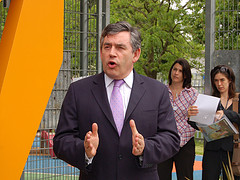- 3 reads

An international cap and trade scheme on carbon may be the most effective way to reduce our global footprint. UK Prime Minister Gordon Brown has proposed a global system for trading carbon emissions, claiming it is our solution for preventing disastrous climate change. Some are skeptical that such a single universal system will take away governments’ ability to administrate their own domestic agendas and will be difficult to install, but the next decade may be the most critical time to implement such a strategy.
Cap and trade systems, or carbon markets, allow individuals to pollute up to a certain limit, or “cap;" the individual may also trade its permissible pollution units among other entities if it has extras or needs more. Companies are able to pollute in the most cost-effective way, cutting costs and pollution at the same time. The United States was the first to implement such a market, made for sulphur dioxide, which reduced emissions by 43 percent from 1990 to 2007 at a quarter of the predicted cost.
Now, more than 35 countries use cap and trade for carbon dioxide emissions, and linking them all to one trading scheme could cut carbon drastically. In a report by the UK’s Department of Energy and Climate Change, the Prime Minister estimated a global CO2 decrease of 40 to 50 percent and a reduced cost of emissions by 70 percent. In addition, a global emissions market would provide financial stimulation for developing countries to transition into low-carbon economies.
Prime Minister Brown’s first priority will be to test the system between the European Union’s emissions trading scheme (EU ETS) and the federal U.S. system by 2015, before continuing to add numerous other countries. This alone could decrease global CO2 emissions by 13 to 27 percent, but Reuters reports that such an alliance might take more time to develop; the U.S. Senate has yet to even approve a domestic carbon market.
In order for international cap and trade to work most effectively, individual nations will need to do their parts in reducing domestic footprints as well. The UK is more than prepared to do this, having committed to a goal of reducing emissions 34 percent by 2020. The UK also has encouraged industrialized nations to contribute in raising $100 billion annually in order to help developing countries cut emissions, fight deforestation, and get involved with climate change. Making carbon trading work can reduce our carbon emissions, prevent global warming, and provide money to poor countries.

